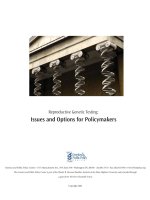Problem options
Bạn đang xem bản rút gọn của tài liệu. Xem và tải ngay bản đầy đủ của tài liệu tại đây (357.93 KB, 2 trang )
PRISM 2Medical Review Form, Version 4th January 2014
OPTIONS FOR PROBLEMS TABLE
Where did the problem occur?
A. Outside hospital care (primary care, ambulance, etc.)
B. In a prior admission/attendance (this trust)
C. In a prior admission/attendance (another secondary healthcare provider)
D. During this admission (first 48 hours)
E. During this admission (after the first 48 hours)
Type of problem in healthcare
Problem in assessment,
investigation or diagnosis
(including assessment of
pressure ulcer risk, VTE risk,
history of falls)
Problem with medication/IV
fluids/electrolytes/oxygen (other
than anaesthetic)
Problem related to treatment
and management plan
(including prevention of
pressure ulcers, falls, VTE)
Problem with infection control
Sub-type of problem in healthcare
A1.Physical examination and history taking
A2.Pressure ulcer risk not assessed/incorrectly assessed
A3.VTE risk assessment not completed/incorrectly completed
A4.Falls history/vulnerability to falls not identified
A5.Swallowing safety not assessed/incorrectly assessed
A6.Tests and investigations missed/delayed/wrong
A7.Diagnosis missed/delayed/wrong
A8..Other assessment, investigation or diagnosis problem
B1.Overhydration
B2.Underhydration
B3.Oxygen supply wrong/delayed/omitted
B4.Allergic/anaphylactic reaction to any medication
B5.Anticoagulants/antiplatelets wrong/delayed/omitted
B6.Antibiotics wrong/delayed/omitted
B7.Insulin or other diabetes medication wrong/delayed/omitted
B8.Opiates wrong/delayed/omitted
B9.Sedatives/hypnotics/antipsychotics wrong/delayed/omitted
B10.Steroids wrong/delayed/omitted
B11.NSAID wrong/delayed/omitted
B12.Diuretics wrong/delayed/omitted
B13.Antihypertensives wrong/delayed/omitted
B14.Cardiovascluar medications wrong/delayed/omitted
B15.Chemotherapy wrong/delayed/omitted
B16.Other medication/IV fluids/electrolytes/oxygen problem
C1.Appropriate medical/surgical treatment not planned
C2.Avoidable delay/omission of planned medical/surgical treatment
C3.Inappropriate/unnecessary medical/surgical treatment given
C4.Inappropriate ceiling of care
C5.Omitted/delayed/wrong treatment from AHPs
C6.Acquired pressure ulcer: prevention below acceptable standard
C7.Acquired pressure ulcer despite apparently acceptable standard of
prevention
C8.Slip/trip/fall: prevention plan below acceptable standard
C9.Slip/trip/fall despite apparently acceptable standard of falls prevention
C10.Developed VTE: prophylaxis below acceptable standard
C11.Developed VTE despite apparently acceptable standard of VTE
prophylaxis
C12.Other treatment or management related problem
D1.Surgical wound infection
D2.Infection from invasive procedure other than surgery
D3.Other healthcare associated wound infection (e.g. infected ulcer)
D4.Infection from indwelling device (catheter, central lines, etc.)
1
PRISM 2Medical Review Form, Version 4th January 2014
Problem related to
operation/invasive procedure
(other than infection control)
Problem in clinical monitoring
(including failure to plan, to
undertake, or to recognise and
respond to changes)
Problem in resuscitation
following a cardiac or
respiratory arrest (including
CPR)
Any other problem not fitting
categories above
D5.Healthcare associated clostridium difficile
D6.Healthcare associated MRSA bloodstream infection
D7.Other bloodstream infection (not MRSA)
D8.Healthcare associated pneumonia/chest infection (including aspiration)
D9.Healthcare associated norovirus/D&V
D10.Other infection control problem
E1.Avoidable delay in undertaking procedure
E2.Inadequate pre-procedure assessment/preparation
E3.Anaesthetic/sedation problem including airway management
E4.Problem related to operative procedure (e.g. perforation, haemorrhage)
E5.Problem related to invasive procedure (e.g. perforation, haemorrhage)
E6.Other procedure related problem
F1.Problem with monitoring TPR/BP/Sats/EWS
F2.Problem with monitoring fluid intake/output
F3.Problem with monitoring nutritional intake
F4.Problem with monitoring technology (e.g. telemetry)
F5.Problem with monitoring neurological observations
F6.Problem with monitoring skin/wound condition
F7.Problem with monitoring via blood tests (use only for routine monitoring)
F8.Other clinical monitoring problem
G1.Delay in beginning resuscitation
G2.Problem in airway management
G3.Problem related to cardiac massage
G4.Problem related to resuscitation medication/fluids
G5.Problem related to resuscitation equipment
G6.Other resuscitation related problem
H. Any other problem not fitting categories above
[Note free text option not required for any ‘other’ categories since the
problem has already been described in free text]
Apparent contributory factors to this problem in healthcare
a. Not possible to identify any clear contributory factors for this problem in healthcare from case note
review
b. Patient factors (e.g. did not disclose relevant history, ignored advice not to combine medication &
alcohol) Note do NOT use patient factors for comorbidities or confusion
c. Individual staff factors (e.g. lack of insight into own competency levels, failure to seek help, reckless,
exhausted, ill)
d. Training, education and supervision factors (e.g. lack of skills, knowledge or experience, lack of
awareness of risks, inadequate supervision, no timely senior review)
e. Task design, guideline and protocol factors (e.g. misleading equipment design, outdated local protocol,
missing or contradictory guidance)
f.
Teamwork, leadership and communication factors (e.g. inadequate handover, inadequate interprofessional challenge, weak leadership, missing paper or electronic records)
g. Local work environment factors (e.g. noise, distractions, inadequate staffing, resources, missing
equipment)
h. Organisation-wide factors (e.g. overall bed capacity, design of IT systems, recruitment freezes)
i.
Other type of contributory factor ……………….
2









